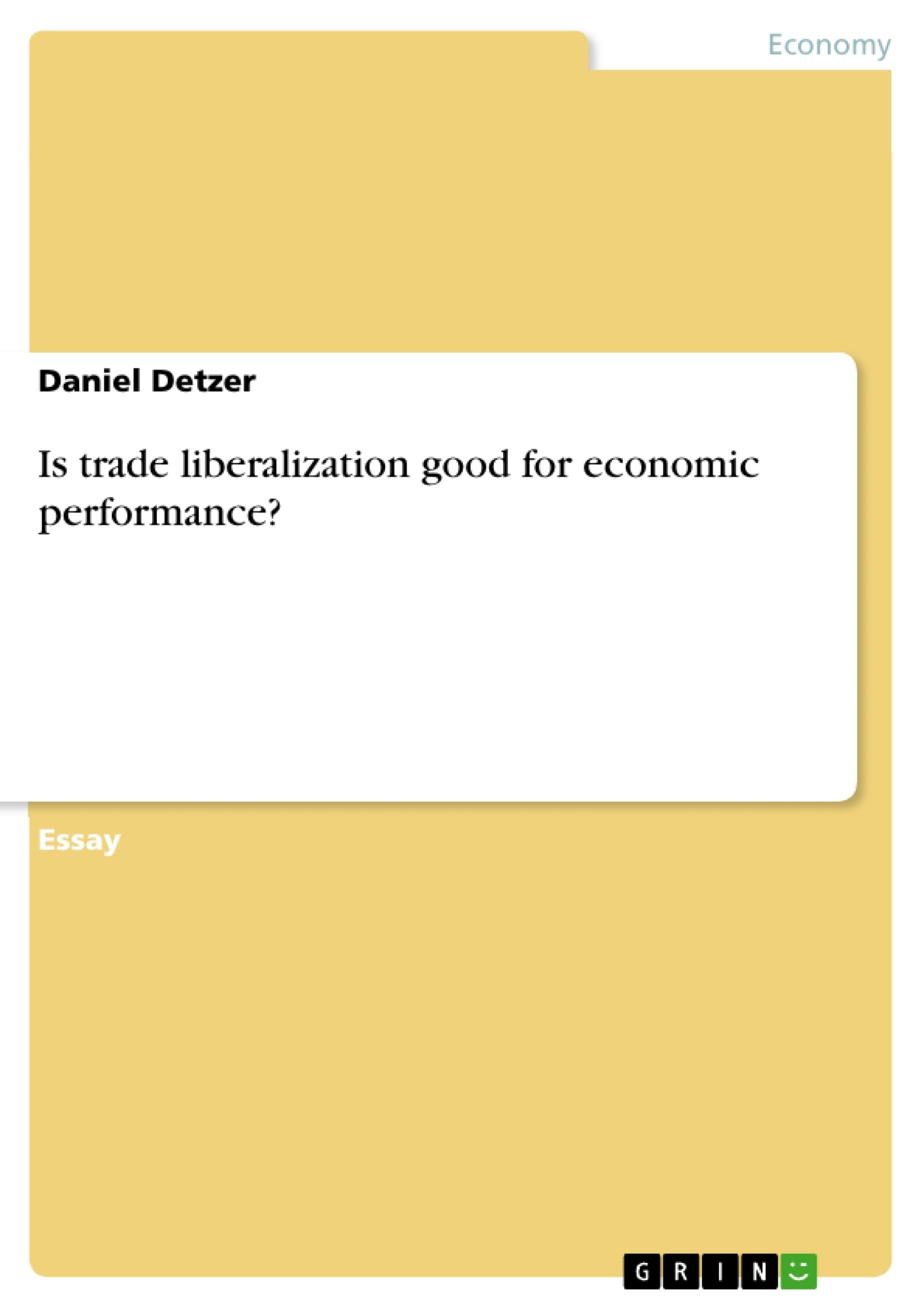In the Washington Consensus trade liberalization is considered as an important policy to spur economic growth. Looking at different trade theories this recommendation is reasonable. However some economists argue that trade liberalization is not necessarily good for growth. They point to shortcomings of the underlying theories or to empirical studies that could not find these beneficial effects.
Therefore this paper will try to answer the question “Is trade liberalization good for economic performance?”. Mostly, economic performance is equalized with economic growth or output. The author is aware of the fact that an increase in GDP is not the only way economic performance could be measured, but due to the limited space the paper will solely focus on this measure, while other things such as sustainability or equality will be neglected. To answer the question the paper will first outline some of the well-known trade theories to give the reader an impression of how free trade could benefit economic performance. Thereafter, exemplarily it will be shown that dropping some of the underlying assumptions can change the predictions entirely. Also with some showcase examples it will be illustrated what happens if one looks at the long term development. Lastly, the paper will look at available empirical research, summarize the results and draw a short conclusion.
Inhaltsverzeichnis (Table of Contents)
- Introduction
- Is trade liberalization good for economic performance?
- Does trade liberalization really increase the overall output?
- The impact of trade liberalization on the growth prospects in the long run
- Trade liberalization and employment opportunities
- Conclusion
Zielsetzung und Themenschwerpunkte (Objectives and Key Themes)
This paper explores the question of whether trade liberalization is beneficial for economic performance, specifically focusing on economic growth or output. It analyzes different trade theories, examines potential shortcomings of those theories, and explores the long-term effects of trade liberalization.
- The impact of trade liberalization on economic performance, particularly economic growth
- Evaluation of various trade theories and their underlying assumptions
- Analysis of the short-term and long-term effects of trade liberalization
- Potential drawbacks and unintended consequences of trade liberalization
- The role of government intervention and protective measures in fostering economic development
Zusammenfassung der Kapitel (Chapter Summaries)
- Introduction: The paper outlines the question of whether trade liberalization is beneficial for economic performance, focusing on economic growth. It highlights the importance of trade liberalization according to the Washington Consensus and presents different viewpoints on the matter.
- Is trade liberalization good for economic performance?: This chapter explores various trade theories, including the theories of absolute advantage, comparative advantage, and the Heckscher-Ohlin-Samuelson model. It discusses how these theories explain the benefits of free trade and the potential for increased output.
- Does trade liberalization really increase the overall output?: This chapter examines the potential drawbacks of trade liberalization, highlighting the assumptions underlying trade theories. It explores the possibility of reduced capital stock and human capital loss due to reshuffling of resources and industries during the transition to free trade.
- The impact of trade liberalization on the growth prospects in the long run: This chapter analyzes the long-term implications of trade liberalization, considering the potential for diminishing returns in certain sectors. It explores how trade liberalization can lead to polarization and potentially hinder economic growth in less developed countries.
- Trade liberalization and employment opportunities: This chapter delves into the impact of trade liberalization on employment opportunities, particularly in less developed countries. It examines the potential for job losses in certain industries and the need for protective measures to promote domestic development.
Schlüsselwörter (Keywords)
The paper centers around the impact of trade liberalization on economic performance, particularly economic growth. It explores various trade theories such as absolute advantage, comparative advantage, and the Heckscher-Ohlin-Samuelson model, examining their underlying assumptions and potential shortcomings. Key themes include the effects of trade liberalization on resource allocation, capital stock, human capital, and employment opportunities. The paper also discusses the long-term implications of trade liberalization, including polarization and the need for government intervention in fostering economic development.
Frequently Asked Questions
Does trade liberalization always lead to economic growth?
While theories like comparative advantage suggest so, some economists argue that dropping certain assumptions can show that trade liberalization may hinder long-term growth or lead to polarization.
What is the 'Washington Consensus' perspective on trade?
The Washington Consensus considers trade liberalization a vital policy for spurring economic growth and increasing overall GDP.
What are the main trade theories discussed in the paper?
The paper outlines the theories of absolute advantage, comparative advantage, and the Heckscher-Ohlin-Samuelson model.
Can trade liberalization cause job losses?
Yes, the paper examines how resource reshuffling during the transition to free trade can lead to human capital loss and decreased employment in certain domestic industries.
How does trade liberalization affect less developed countries in the long run?
It can potentially lead to diminishing returns in specific sectors and economic polarization, making government intervention or protective measures necessary for development.
What is the focus of 'economic performance' in this study?
Due to limited space, the study focuses primarily on GDP growth and output, while acknowledging that sustainability and equality are also measures of performance.
- Arbeit zitieren
- Daniel Detzer (Autor:in), 2010, Is trade liberalization good for economic performance?, München, GRIN Verlag, https://www.hausarbeiten.de/document/153651


